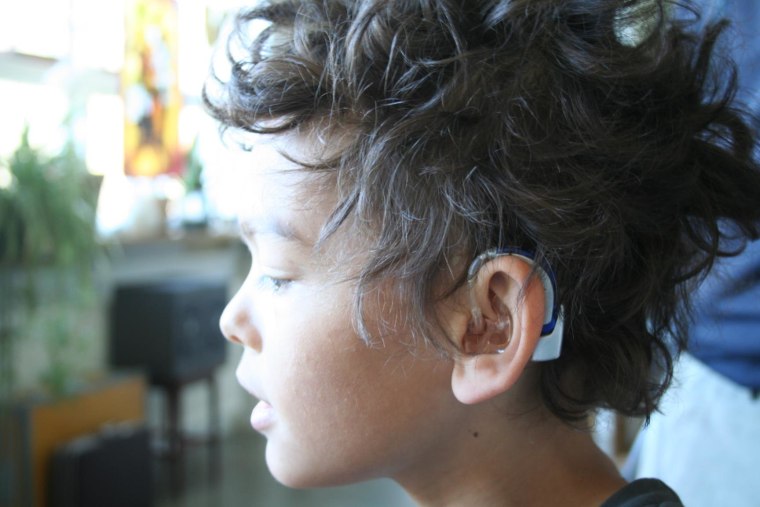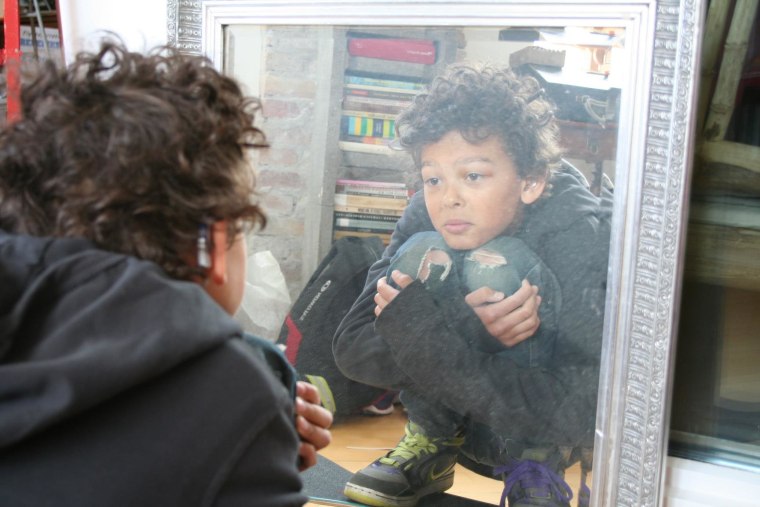I was a first time mother, far from home, when I discovered that my three-year-old son had a hearing impairment.
It was a shock because he had passed all his hearing tests and was even one of the first babies in my mothering group to say “bye-bye” on cue. I thought he was not only developing by the book, but excelling too.
In retrospect, there were signs that something was amiss. When he played alone he was so deeply concentrated that he was hard to reach (“he’s just ignoring you”, people told me), he had a deep physical attachment to me (he would never just run off on his own), he hit other kids in daycare and kindergarten (anything to get a reaction he could understand) and he had started to mouth the words I was saying (apparently he was teaching himself how to lip read).
I was relieved when we received his diagnosis. The worst part was not knowing what was wrong. It also explained so much, and of all the things that could have been ‘wrong’ with my little boy, deafness was certainly not the worst. His father took the news less well. “But I wanted him to study music!” I remember he exclaimed.
We later learned that it’s quite normal for a parent to experience this depression and mourn the “perfect” child they used to have. The trick is to see that your child is still perfect, that they are the perfect expression of what they are meant to be.
Kai’s world blossomed after getting his hearing aids. It was obvious that he needed them from the moment he put them on. Having not heard for so long, he appreciated how this piece of technology could change his life completely.

Fitting in
But even though he took to his new technologically-improved life, I needed him to know he wasn’t alone. I made sure he was surrounded with imagery of other children with hearing aids and brought him into contact with other hearing-impaired children.
Ironically, he isn’t actually “deaf enough” to join the deaf community and we did not have the choice to send him to a special needs school for deaf children. If we had, he would have learned to sign and would now be part of – what I have experienced to be – a proud parallel society with its own culture, identity and role models. Instead we gave him hearing aids and sent him to ordinary schools where he received additional learning support.
This approach is called ‘mainstreaming’ and superficially it sounds like a good idea. If we could choose to be part of a bigger society, wouldn’t we? However, studies have shown that children like my son with moderate to heavy hearing loss tend to experience a lower quality of life than children who are more profoundly deaf. The latter go to school with each other, where they learn sign language and spend time with people who have the same issues as they do. This trend has been changing, to great debate.

Ambitions
Kai is now a teenager and seems to be thriving. His father’s fears were unfounded and he has already been in two bands, playing guitar in the first and drums in the second. He is even experimenting with music production. I’ve seen him design his own t-shirts and his father told me he’s a great skier. I know he’s not too bad on a skateboard either.
He still sticks out, though. One morning, a little girl came up to us and asked me, “Do those hearing aids help him?”
She was sweet – I love it when people just come right out and ask instead of gawking at him. And I understood why she asked. I was on my way to pick Kai up from school one day, when a group of kids from the deaf school boarded at Østerport Station [in Copenhagen, Denmark] and sat across from me. Despite having a deaf child, and against my better judgment, I stared at them.
I stared at their hands and the speed that they signed. I stared at their hearing aids and wondered if Kai would have preferred hearing aids like the blue pair worn by one of the boys. They didn’t notice me, so wrapped up and secure in their own little world to give me notice. I wish that my son was sitting next to me so we could witness this silent beauty – the incredible ability of human beings to adapt.
Then I remembered the little girl who so openly approached us the other morning. Some day, she and Kai could get on a Copenhagen train and talk, and continue their lives together with everyone else in the city. He too has adapted and, despite his limitations, is thriving.
I remember when he first learned about Einstein and he asked me what type of scientist he was.
“A physicist,” I replied.
“Well, I want to be one like him when I grow up.” I smiled, knowing that Kai didn’t necessarily want to be a physicist; he just wanted to earn people’s respect like Einstein had.
Kai may go on to learn about general relativity. He may even study music at the Royal Academy. We really don’t know what he will do. As long as the society he finds himself in is committed to accommodating everyone, the only limits he will ever experience are the limits he chooses to accept.
[This essay was originally published in The Murmur, an English language newspaper in Copenhagen]
